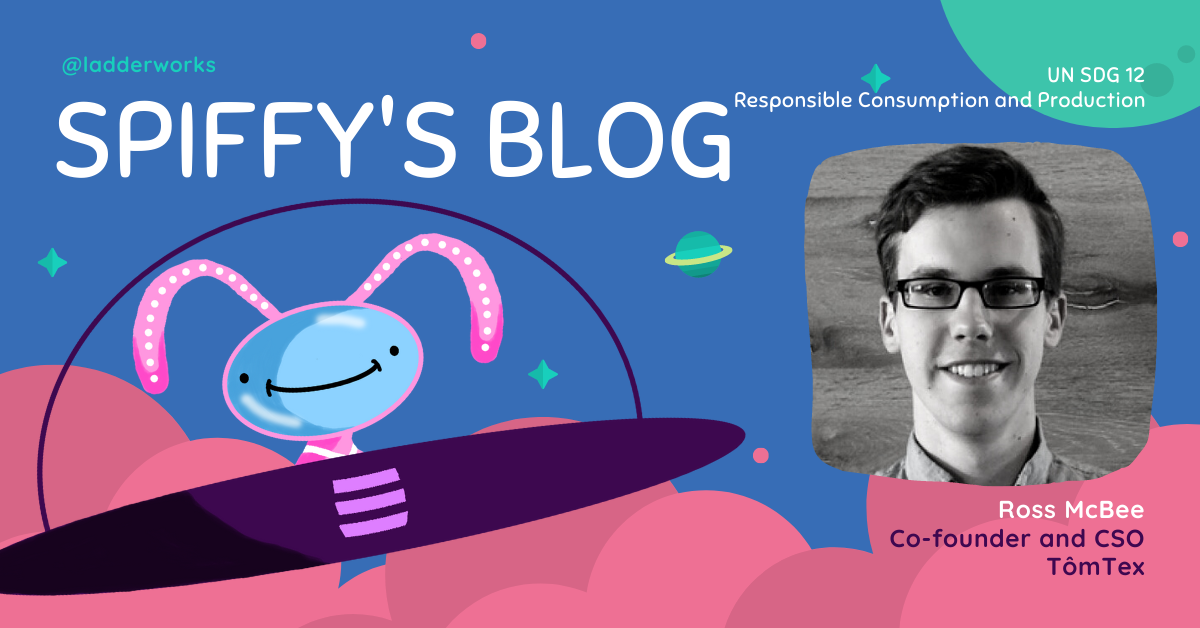Ross McBee: Building Sustainable Biomaterials Directly from Waste

Hi friends, it’s Spiffy, back again on Planet Earth with an eye on entrepreneurs making the world a more equitable place! I have one more interview for you this week. Today I’m excited to cruise around with Ross McBee, the co-founder and CSO at TômTex, a company working towards responsible consumption and production.
Spiffy: Hi Ross, thanks a million for talking to me today. Tell me, what challenge is TômTex addressing?
Ross: It’s great to be here, Spiffy! Inspired by nature's remarkable ability to reuse "waste", TômTex are working to build next-generation sustainable materials sourced directly from waste. Our first product, aimed at the leather market, is made from seafood wastes like shrimp or crab shells, and is 100% bio-based with no plastics or petrochemical components. We believe in a future where our clothing, accessories and other materials are circular, sustainable, and sophisticated nature-inspired biomaterials.
Spiffy: What motivated you to do it?
Ross: Simply put, because we can't afford not to. The impact of the production of leather and textiles in general is devastating, both environmentally and in human terms, generating immense carbon emissions, producing vast amounts of pollution and waste, and involving devastating labor practices. Our future must involve gentler, more equitable, and more sustainable ways to clothe ourselves, and we're excited to try to play our part in that future.
Spiffy: Can you elaborate on how that involves working towards a more equitable world?
Ross: The human impacts of leather manufacturing are hard to overstate—typically involving toxic or heavy metal chemistries like chrome tanning, to say nothing of the many "exotic" animals killed for their skins. We are aiming to divert otherwise polluting waste, sourced from equitable, sustainable streams to produce a material with much lower human and environmental impacts than traditional leather manufacturing.
Spiffy: Tell me about a recent company milestone or initiative and the impact it makes on your community.
Ross: We've recently closed a pre-seed funding round of $1.7 million, to be spent on expanding our team, continuing to refine our material, and building our scale-up plan. We're super excited to have the institutional support and expertise of our investors to take these next steps in our journey (and if you're a polymer scientist looking to move into sustainable materials, we'd love to hear from you).
Spiffy: Please share an experience when you faced failure and didn't give up, and what you learnt from it.
Ross: The science and engineering process of developing a material like ours is in a constant state of failure and refinement. The old adage is that 50% (if you're lucky!) of research simply...doesn't work, so getting good at dealing with failure is very important. The important part is to learn, and if you can, structure your work such that when you inevitably do fail, you can learn the maximum amount from that failure. Easier said than done, but we know nature can do it, so humbly looking, and irrepressibly working, are musts.
Spiffy: That’s a great way of looking at it! What is something you've unexpectedly learned from someone recently?
Ross: Where to start! We are constantly looking to nature for inspiration, large and small. Recently, I've been reading about diatoms and am just in awe of the diversity and sophistication of their glass shells, far more advanced than anything us humans can hope to make given our current technology and understanding. And these little guys are everywhere! You can even buy powdered, ancient diatom skeletons at the hardware store to kill bugs. How wonderful, and inspiring, that things so marvelous are just under our noses everywhere in nature.
Spiffy: Thanks for speaking with me today, Ross—it’s been an honor!
Ross McBee is a co-founder and CSO of TômTex Inc. a startup developing sustainable biomaterials from waste. Ross holds undergraduate degrees from the University of Texas and a PhD from Columbia University, working under Prof. Harris Wang on synthetic genomics and engineered living materials. (First published on the Ladderworks website on April 29, 2022.)
© 2022 Ladderworks LLC. Edited by Anushree Nande. Spiffy’s illustration by Shreyas Navare. For the Ladderworks digital curriculum to help K-3 kids advance the UN SDGs, visit Spiffy's Corner here.


